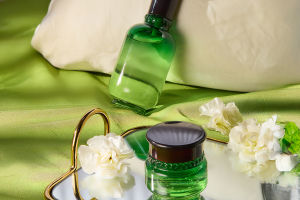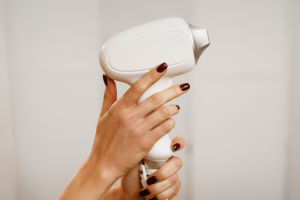Say Goodbye to Dandruff
We all know how frustrating dandruff can be. It's that pesky, annoying flake that seems to appear out of nowhere, making you self-conscious and sometimes even affecting your confidence.
But did you know that dandruff isn't always caused by dry scalp or skin conditions?
Sometimes, it can be a result of how we take care of our hair. We may be unknowingly making mistakes in our daily hair care routines that contribute to dandruff. Let's explore how our hair care habits might be the real culprits.
The Role of Shampoo and Washing Frequency
One of the most common reasons for dandruff is using the wrong shampoo or washing our hair too frequently (or not enough!). We might think that washing our hair daily is a good idea, but this can actually deprive the scalp of its natural oils, leading to dryness and irritation. This, in turn, causes the scalp to flake. On the other hand, if we wait too long between washes, oil buildup can create a breeding ground for dandruff-causing fungi.
So, how often should we wash our hair? It really depends on your hair type and lifestyle. If you have oily hair, washing it every other day might be necessary. For dry or normal hair, two to three times a week is usually sufficient. Pay attention to how your scalp feels and adjust your washing routine accordingly.
Choosing the Right Shampoo for Your Scalp
We've all been there – picking up the latest shampoo that promises to make our hair shine like the stars. But not all shampoos are created equal. If you're dealing with dandruff, it's essential to choose a shampoo that is specifically formulated to treat dandruff and balance your scalp. Shampoos containing ingredients like zinc pyrithione, salicylic acid, or ketoconazole can help fight the fungal overgrowth that often leads to dandruff.
However, be cautious with shampoos that contain harsh chemicals or fragrances. These can irritate the scalp and make dandruff worse. Opt for gentle, sulfate-free shampoos and avoid overly fragrant products, as these can trigger scalp sensitivity.
The Importance of Scalp Massage
Sometimes, we focus so much on our hair that we forget to take care of our scalp. A healthy scalp is the foundation for healthy hair. Regular scalp massages can improve blood circulation, helping to promote hair growth and eliminate flakes. It also helps distribute natural oils across the scalp, preventing dryness.
Try massaging your scalp for a few minutes while shampooing. Use your fingertips, not your nails, and gently work in circular motions. This will stimulate your scalp without causing damage or irritation. It's a simple yet effective way to keep your scalp healthy and flake-free.
Avoiding Hot Water and Harsh Styling Tools
We know how tempting it is to jump into a hot shower and let the warm water soothe us, but did you know that hot water can actually aggravate dandruff? It strips the scalp of its natural oils, making it dry and prone to flaking. If you're dealing with dandruff, it's best to wash your hair with lukewarm water instead.
Additionally, we often rely on hot styling tools like hair dryers, straighteners, and curling irons. While they give us the look we want, they can also damage the scalp and hair follicles, contributing to dandruff. Try to minimize the use of heat on your hair, or use heat protection sprays to prevent further irritation.
Diet and Dandruff: What's the Connection?
Did you know that what we eat can have an impact on our scalp health? A poor diet lacking in essential nutrients can contribute to dandruff. Specifically, a diet that's low in zinc, omega-3 fatty acids, and B vitamins can lead to dryness and irritation on the scalp.
To help prevent dandruff, focus on eating a balanced diet that includes plenty of fruits, vegetables, and healthy fats. Foods like nuts, seeds, and fish can promote a healthy scalp, while staying hydrated helps to keep your skin and scalp moisturized. A few dietary tweaks can make a big difference in the health of your scalp and hair.
When to Seek Professional Help
Sometimes, despite our best efforts, dandruff persists. If you've tried changing your hair care routine, using dandruff shampoos, and improving your diet, but still see flakes, it might be time to consult a dermatologist. There could be an underlying skin condition like eczema, psoriasis, or seborrheic dermatitis that requires professional treatment.
A dermatologist can help diagnose the issue and recommend treatments that are right for your specific needs. They might suggest prescription-strength shampoos, topical treatments, or other methods to manage your scalp condition.
Conclusion: Let's Take Better Care of Our Scalp!
As we've learned, dandruff can often be traced back to our hair care habits. By choosing the right shampoo, adjusting our washing frequency, and taking care of our scalp, we can reduce and even eliminate dandruff. Remember, it's not just about the hair—it's about the scalp underneath it. So, let's pay attention to the little things we do every day, and give our scalp the love and care it deserves!
We hope this article has helped you understand some of the common hair care mistakes that can lead to dandruff. If you have any personal tips or tricks for tackling dandruff, feel free to share them with us! We love hearing from you.
Contact to : xyjph123@gmail.com
Privacy Agreement
Copyright © boyuanhulian 2020 - 2022. All Right Reserved.
Privacy Agreement
Copyright © boyuanhulian 2020 - 2022. All Right Reserved.


